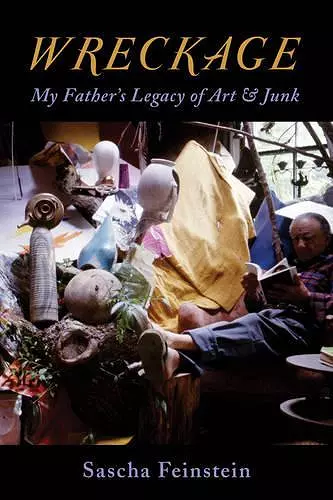Wreckage
My Father’s Legacy of Art & Junk
Format:Hardback
Publisher:Bucknell University Press
Published:24th Feb '17
Currently unavailable, and unfortunately no date known when it will be back

In this memoir, Sascha Feinstein recounts life with his father, Sam Feinstein, who was both a brilliant artist and a hoarder of monumental proportions. He collected only uncollectible objects—artifacts that required him to give them importance—and at the time of his death in 2003, his hoarding had fundamentally destroyed all three of his large homes. Despite this, Sam Feinstein was a remarkable painter and art teacher. This strange double helix of creativity and destruction guides these collage-like reflections. Like his students’ canvases—paintings inspired by enormous still lifes constructed from the world’s refuse—this book incorporates myriad sources in order to create a more layered experience for the reader. The final result is the depiction of a painter with the highest artistic ideals who nevertheless left behind an incalculable amount of physical and emotional wreckage.
Family wreckage is often hidden, abiding in unshared memories. For good or ill, much of Feinstein’s past was all too tangible. His father, Sam, an artist and teacher, rescued and hoarded discards, which slowly formed massive mounds that destroyed all three of his large homes. His seemingly worthless collectibles were important because he deemed them so, perhaps, writes his son, because of Sam’s Ukrainian-refugee background, which was ‘saturated with loss and recovery, financial tragedy and constant regrowth’ and made him ‘covet free, discarded artifacts.’ Ultimately, Feinstein had to dismantle and cart away a forest of choking wisteria, dead trees, and poison ivy as well as broken furniture, hardened cement chunks, and other junk Sam had used artistically from his Cape Cod house, along with masses of animal excrement from a shed. In all, 30 tons of refuse had at be removed to save the structures. Feinstein’s chronicle of this demanding effort is an uncompromising, philosophical, and powerful excavation and analysis of one family’s history and dynamics. * Booklist *
Just as his father, a “master scavenger,” made art from things he found, Sascha Feinstein has fashioned a beautiful book out of the hard facts, peculiar love, and brilliant ruins that are his relationship with his father. Wreckage tells the moving story of the father, this great architect of junk who lives in his “paradise of accumulation,” and the difficult but persistent love of the son. In Feinstein’s pages I felt transported back to an older Cape Cod, of dump-picking and ticks and drive-ins, and to a time before antiseptic, air-conditioned homes when quirky beauty counted, and where that beauty grew hidden amidst the brambles. In the end, Wreckage is the story of love and reclamation, of making something out of what was lost. -- David Gessner, author of Return of the Osprey and All the Wild That Remains
“Taking on the wreckage,” Sascha Feinstein writes of the overwhelming, impossible legacy of junk the artist and hoarder who raised him left behind, “meant taking on my father.” This book is his accounting: desperate and funny, horrifying and artful, and much less bitter than it had every right to be. If the father’s legacy suffocates, his son’s accomplishment is to find not only room to breathe, but the gifts and challenges that launch a young writer on his way. The buoyancy required to survive a father’s excess becomes a son’s source of strength, enabling him to build—with the good help of poetry, jazz, and the movies—a self and a family, and even to restore a nearly ruined house to radiant life. -- Mark Doty, author of Heaven's Coast
In Wreckage, Sascha Feinstein becomes an archeologist of his father’s leavings, both physical and emotional. From three houses and from an overgrown lot on Cape Cod, all crammed with a bizarre accumulation of stuff, he salvages rare moments of inspiration and joy. In so doing, he fulfills his father’s dream of “transforming junk into beauty.” -- Scott Russell Sanders, author of A Private History of Awe
ISBN: 9781611487855
Dimensions: 236mm x 158mm x 22mm
Weight: 472g
218 pages